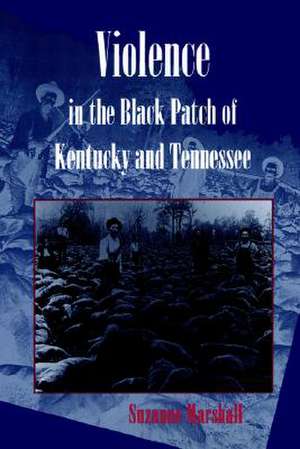Violence in the Black Patch of Kentucky and Tennessee
Autor Suzanne Marshallen Limba Engleză Hardback – dec 1994 – vârsta ani
From its settlement in the late 1700s, the Black Patch-an agricultural region of western Kentucky and Middle Tennessee-has been known for its dark-fired, heavy-leafed tobacco, so green that it is called "black." But as the settlers of this region sowed the seeds of tobacco, they also sowed the seeds of violence. In Violence in the Black Patch of Kentucky and Tennessee, Suzanne Marshall provides a thorough, engrossing depiction of the role played by violence in the development of the Black Patch culture.
Violence was a key element in the white settlement of this frontier wilderness. After forcibly removing Native Americans from the region, white settlers established a tradition of violence that maintained order and morality. White male dominance over family members and black slaves was also sustained by violence. A man's mean reputation defined his identity and place within the community, instilling respect and fear among outsiders.
The Civil War and the industrial revolution also helped perpetuate violence in the Black Patch. With markedly divided sympathies during the Civil War, the Black Patch inspired guerrilla warfare against citizens and slaves by renegade bands of former soldiers from both sides. Marshall's study culminates with a discussion of the Night Riders' vigilante activity during Black Patch wars that originated with this country's shift from an agricultural society to an industrial one.
By focusing on the violence in this culture, Marshall provides a key to understanding both the cultural components that were unique to the area and those that were shared with other isolated rural communities. She draws extensively from oral history and ethnographic methodology as well as court records, church records, diaries, and newspapers. Anecdotes depicting folk beliefs and heroes, old-time religion, the economics of farm life, race relations, and gender roles, serve to enliven this study and enrich our understanding of a fascinating and distinctive region.
Violence was a key element in the white settlement of this frontier wilderness. After forcibly removing Native Americans from the region, white settlers established a tradition of violence that maintained order and morality. White male dominance over family members and black slaves was also sustained by violence. A man's mean reputation defined his identity and place within the community, instilling respect and fear among outsiders.
The Civil War and the industrial revolution also helped perpetuate violence in the Black Patch. With markedly divided sympathies during the Civil War, the Black Patch inspired guerrilla warfare against citizens and slaves by renegade bands of former soldiers from both sides. Marshall's study culminates with a discussion of the Night Riders' vigilante activity during Black Patch wars that originated with this country's shift from an agricultural society to an industrial one.
By focusing on the violence in this culture, Marshall provides a key to understanding both the cultural components that were unique to the area and those that were shared with other isolated rural communities. She draws extensively from oral history and ethnographic methodology as well as court records, church records, diaries, and newspapers. Anecdotes depicting folk beliefs and heroes, old-time religion, the economics of farm life, race relations, and gender roles, serve to enliven this study and enrich our understanding of a fascinating and distinctive region.
Preț: 425.68 lei
Nou
Puncte Express: 639
Preț estimativ în valută:
81.46€ • 84.74$ • 67.25£
81.46€ • 84.74$ • 67.25£
Carte tipărită la comandă
Livrare economică 14-28 aprilie
Preluare comenzi: 021 569.72.76
Specificații
ISBN-13: 9780826209719
ISBN-10: 0826209718
Pagini: 216
Ilustrații: illus, maps
Dimensiuni: 152 x 229 x 18 mm
Greutate: 0.51 kg
Ediția:First Edition
Editura: University of Missouri Press
Colecția University of Missouri
ISBN-10: 0826209718
Pagini: 216
Ilustrații: illus, maps
Dimensiuni: 152 x 229 x 18 mm
Greutate: 0.51 kg
Ediția:First Edition
Editura: University of Missouri Press
Colecția University of Missouri
Recenzii
"By focusing on the violence in the culture, Marshall provides a key to understanding both the cultural components that were unique to the area and those that were shared by other isolated rural communities."--Research & Reference Book News
"Marshall's impressive and extensive use of oral testimony also demonstrates how this culture of violence was embedded in the folklore and social memory of the region and generated a community ethos rooted in pride."--Southern Historian
"The strength of this book is Marshall's ability to tell the stories of the men and women caught up in both the growing of tobacco and in the Black Patch's violent ways. In about 160 pages of text, it conveys much information, and there is a particularly good chapter on the cultivation and culture of tobacco."--Agricultural History
"Suzanne Marshall offers a sweeping survey of the patterns and evolution of violence in the Black Patch, a twenty-eight county region in southern and western Kentucky and middle Tennessee, named for the dark variety of tobacco that was its major cash crop in the nineteenth century. She writes as an insider and traces her interest in the subject to her background: she witnessed tobacco cultivation as a child in the Black Patch, grew up hearing stories of tobacco farmers turned 'night riders' and of whippings and barn burnings, and still has Black Patch kin and friends. In addition to newspapers and court records, Marshall relies heavily on interviews--many conducted by herself--with older residents to describe the dimensions of the regions's violence. . . . Nonetheless, because of its rich description, this volume is a welcome addition to the growing number of local and regional studies that explore the dimensions of violence both in and beyond the cotton South."--American Historical Review
"Marshall deserves praise for her splendid oral history research. Moreover, her argument that the South should not be viewed as a monolith is certainly welcome. Perhaps this volume will encourage further study of the many subregions within the American South."--Journal of American History
"Marshall's study establishes the historical roots of western Kentucky violence and thereby corrects the geographical imbalance which has heretofore characterized the study of violence in the commonwealth."--Register of the Kentucky Historical Society
"The author has provided an intriguing glimpse into the culture of the Black Patch, a culture that accepted violence as a normal, even desirable and beneficial, part of life. She has taken full advantage of papers, court transcripts, public documents, and relevant secondary works. But her most impressive sources are the extensive oral history collections that she mined and the personal interviews that she conducted. Marshall's work is representative of the latest work in cultural history; it cuts across disciplinary lines in a sophisticated manner. Suzanne Marshall has provided us with a valuable, intriguing, and sophisticated look at violence in a southern subregion. For that we are in her debt."--Alabama Review
Notă biografică
Suzanne Marshall is Assistant Professor of History at Jacksonville State University in Jacksonville, Alabama.













